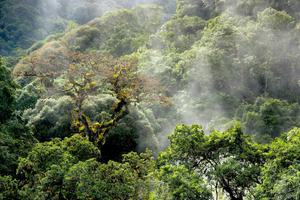Officials and forest guards examine the stumps of illegally felled Algerian oak trees in Ain Draham, Tunisia in April. Tunisia Ministry of Agriculture / Thomson Reuters Foundation
Loggers in Tunisia are taking advantage of the country’s coronavirus restrictions, increasingly entering forests after a national curfew to illegally fell thousands of trees in the darkness of night. In early April, loggers in the northwest region of Ain Draham cut down 400 endangered Algerian oak trees, some more than 300 years old, to make charcoal, the Thomson Reuters Foundation reported.
Since the North African country instituted lockdowns on March 22, more than 200 forest violations have been recorded — 10 times what Tunisia’s Ministry of Agriculture documented over the same period last year. A similar uptick in illegal logging has occurred in the Brazilian Amazon in recent months, according to The Wall Street Journal.
Tunisia’s Covid-19 restrictions mean there are fewer people around to catch violators, Mohamed Boufaroua, general director of forestry at the Ministry of Agriculture, told Thomson Reuters. “They want to take advantage of this period of confinement.”
Environmental groups say Tunisia had too few guards patrolling its protected forests even before the pandemic, with just 5,150 workers surveying 13.8 million acres. The virus has only made the situation worse, they say. At the same time, many Tunisians who have lost jobs due to the virus are seeking work in illicit sectors, such as logging and charcoal production. Illegal loggers can make up to $690 per month, more than double the country’s average salary, said Ines Labiadh, head of environmental justice at the Tunisian Forum for Economic and Social Rights.
Government officials began gradually reopening parts of Tunisia’s economy this week, including lifting some travel restrictions.



